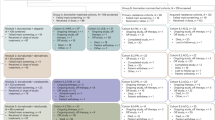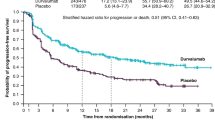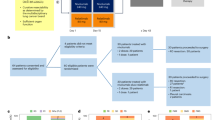Abstract
Background
Cadonilimab is a bispecific antibody that simultaneously targets programmed cell death receptor-1 and cytotoxic T lymphocyte-associated antigen-4. This study aimed to assess the safety and efficacy of cadonilimab plus anlotinib for the first-line treatment of advanced non-small cell lung cancer (NSCLC) without sensitizing EGFR/ALK/ROS1 mutations.
Methods
Patients received cadonilimab 15 mg/kg and 10 mg/kg every three weeks (Q3W) plus anlotinib at doses of 10 or 12 mg once daily for two weeks on a one-week-off schedule. The primary endpoints included safety and objective response rate (ORR).
Results
Sixty-nine treatment-naïve patients received cadonilimab 15 mg/kg Q3W combination (n = 49) and 10 mg/kg Q3W combination (n = 20). Treatment-related adverse events (TRAEs) were reported in 48 (98.0%) and 19 (95.0%) patients, with grade ≥3 TRAEs occurring in 29 (59.2%) and five (25.0%) patients, respectively. TRAEs leading to cadonilimab discontinuation occurred in eight (16.3%) and one (5.0%) patients in the cadonilimab 15 mg/kg Q3W and 10 mg/kg Q3W dosing groups. The confirmed ORRs were 51.0% (25/49) and 60.0% (12/20) accordingly.
Conclusions
Cadonilimab 10 mg/kg Q3W plus anlotinib showed manageable safety and promising efficacy as a first-line chemo-free treatment for advanced NSCLC.
ClinicalTrials.gov identifier
NCT04646330.
This is a preview of subscription content, access via your institution
Access options
Subscribe to this journal
Receive 24 print issues and online access
$259.00 per year
only $10.79 per issue
Buy this article
- Purchase on Springer Link
- Instant access to full article PDF
Prices may be subject to local taxes which are calculated during checkout



Similar content being viewed by others
Data availability
All data related to the study are included in the article or the supplementary materials. Individual participant data will not be available.
References
Bray F, Ferlay J, Soerjomataram I, Siegel RL, Torre LA, Jemal A. Global cancer statistics 2018: GLOBOCAN estimates of incidence and mortality worldwide for 36 cancers in 185 countries. CA Cancer J Clin. 2018;68:394–424.
Nicholson AG, Tsao MS, Beasley MB, Borczuk AC, Brambilla E, Cooper WA, et al. The 2021 WHO classification of lung tumors: impact of advances since 2015. J Thorac Oncol. 2022;17:362–87.
Reck M, Rodriguez-Abreu D, Robinson AG, Hui R, Csoszi T, Fulop A, et al. Pembrolizumab versus chemotherapy for PD-L1-positive non-small-cell lung cancer. N Engl J Med. 2016;375:1823–33.
Mok TSK, Wu YL, Kudaba I, Kowalski DM, Cho BC, Turna HZ, et al. Pembrolizumab versus chemotherapy for previously untreated, PD-L1-expressing, locally advanced or metastatic non-small-cell lung cancer (KEYNOTE-042): a randomised, open-label, controlled, phase 3 trial. Lancet. 2019;393:1819–30.
Herbst RS, Giaccone G, de Marinis F, Reinmuth N, Vergnenegre A, Barrios CH, et al. Atezolizumab for First-Line Treatment of PD-L1-Selected Patients with NSCLC. N Engl J Med. 2020;383:1328–39.
Sezer A, Kilickap S, Gumus M, Bondarenko I, Ozguroglu M, Gogishvili M, et al. Cemiplimab monotherapy for first-line treatment of advanced non-small-cell lung cancer with PD-L1 of at least 50%: a multicentre, open-label, global, phase 3, randomised, controlled trial. Lancet. 2021;397:592–604.
Hellmann MD, Paz-Ares L, Bernabe Caro R, Zurawski B, Kim SW, Carcereny Costa E, et al. Nivolumab plus ipilimumab in advanced non-small-cell lung cancer. N Engl J Med. 2019;381:2020–31.
Chu T, Zhong R, Zhong H, Zhang B, Zhang W, Shi C, et al. Phase 1b study of sintilimab plus anlotinib as first-line therapy in patients with advanced NSCLC. J Thorac Oncol. 2021;16:643–52.
Zhou C, Wang Y, Zhao J, Chen G, Liu Z, Gu K, et al. Efficacy and biomarker analysis of camrelizumab in combination with apatinib in patients with advanced nonsquamous NSCLC previously treated with chemotherapy. Clin Cancer Res. 2021;27:1296–304.
Yang J-H, Luft A, Jiménez EDLM, Lee J, Koralewski P, Karadurmus N, et al. Pembrolizumab (Pembro) with or without lenvatinib (Lenva) in first-line metastatic NSCLC with PD-L1 TPS≥ 1%(LEAP-007): a phase III, randomized, double-blind study. Ann Oncol. 2021;32:S1429–S30.
Brose MS, Vogelzang NJ, DiSimone C, Jain SK, Richards DA, Encarnacion CA, et al. A phase Ib/II trial of lenvatinib plus pembrolizumab in non-small cell lung cancer. J Clin Oncol. 2019;37:16.
Li B, Huang Z, Pang X, Zhong T, Chen N, Wang M, et al. Bispecific antibodies with an anti-PD-1 backbone for cancer therapy generate enhanced immune activity. Cancer Res. 2018;78:3827.
Han B, Li K, Wang Q, Zhang L, Shi J, Wang Z, et al. Effect of anlotinib as a third-line or further treatment on overall survival of patients with advanced non-small cell lung cancer: the ALTER 0303 phase 3 randomized clinical trial. JAMA Oncol. 2018;4:1569–75.
Huang Z, Pang X, Zhong T, Chen N, He X, Xia D, et al. Cadonilimab, an anti-PD1/CTLA4 bi-specific antibody with Fc effector null backbone. J ImmunoTher Cancer. 2021;9:A313–4.
Markman B, Tran B, Gan H, Prawira A, Coward J, Jin X, et al. A Phase 1 study of AK104, a tetrameric bispecific antibody that targets PD-1 and CTLA-4 in patients with advanced solid tumors. J Immunother Cancer. 2019;7:283.
Millward M, Frentzas S, Gan H, Prawira A, Tran B, Coward J, et al. Safety and antitumor activity of AK104, a bispecific antibody targeting PD-1 and CTLA-4, in patients with mesothelioma which is relapsed or refractory to standard therapies. Ann Oncol. 2020;31:S705–S06.
Wu X, Ji J, Lou H, Li Y, Feng M, Xu N, et al. Efficacy and safety of cadonilimab, an anti-PD-1/CTLA4 bi-specific antibody, in previously treated recurrent or metastatic (R/M) cervical cancer: a multicenter, open-label, single-arm, phase II trial. Gynecol Oncol. 2022;166:S47–S48.
Gandhi L, Rodriguez-Abreu D, Gadgeel S, Esteban E, Felip E, De Angelis F, et al. Pembrolizumab plus chemotherapy in metastatic non-small-cell lung cancer. N Engl J Med. 2018;378:2078–92.
Paz-Ares L, Luft A, Vicente D, Tafreshi A, Gumus M, Mazieres J, et al. Pembrolizumab plus chemotherapy for squamous non-small-cell lung cancer. N Engl J Med. 2018;379:2040–51.
Zhao S, Ren S, Jiang T, Zhu B, Li X, Zhao C, et al. Low-dose apatinib optimizes tumor microenvironment and potentiates antitumor effect of PD-1/PD-L1 blockade in lung cancer. Cancer Immunol Res. 2019;7:630–43.
Hack SP, Zhu AX, Wang Y. Augmenting anticancer immunity through combined targeting of angiogenic and PD-1/PD-L1 pathways: challenges and opportunities. Front Immunol. 2020;11:598877.
Su Y, Luo B, Lu Y, Wang D, Yan J, Zheng J, et al. Anlotinib induces a T cell-inflamed tumor microenvironment by facilitating vessel normalization and enhances the efficacy of PD-1 checkpoint blockade in neuroblastoma. Clin Cancer Res. 2022;28:793–809.
Zhai C, Zhang X, Ren L, You L, Pan Q, Pan H, et al. The efficacy and safety of anlotinib combined with PD-1 antibody for third-line or further-line treatment of patients with advanced non-small-cell lung cancer. Front Oncol. 2020;10:619010.
Socinski MA, Jotte RM, Cappuzzo F, Orlandi F, Stroyakovskiy D, Nogami N, et al. Atezolizumab for first-line treatment of metastatic nonsquamous NSCLC. N Engl J Med. 2018;378:2288–301.
Boyer M, Şendur MA, Rodríguez-Abreu D, Park K, Lee DH, Çiçin I, et al. Pembrolizumab plus ipilimumab or placebo for metastatic non–small-cell lung cancer with PD-L1 tumor proportion score≥ 50%: randomized, double-blind phase III KEYNOTE-598 study. J Clin Oncol. 2021;39:2327–38.
Felip E, Majem M, Doger B, Clay TD, Carcereny E, Bondarenko I, et al. A phase II study (TACTI-002) in first-line metastatic non–small cell lung carcinoma investigating eftilagimod alpha (soluble LAG-3 protein) and pembrolizumab: Updated results from a PD-L1 unselected population. J Clin Oncol. 2022;40:9003.
Acknowledgements
This work was funded by Akeso Biopharma Inc. We thank all patients and their families who participated in this study, along with all investigators and site personnel. We would like to thank Springer Nature (www.springernature.com) for English language editing.
Funding
This work was supported by Akeso Biopharma, Inc. and The Science and Technology Innovation Program of Hunan Province (2023SK4024).
Author information
Authors and Affiliations
Contributions
BC, WY, XL, and GL: Formal analysis, Investigation, Resources, Data Curation, Writing - Original Draft, Writing - Review & Editing. QC, HL, YD, JL, HD, HW, ZX, HS, LL, LX, YX, FX, YK, XP, KL, QW, and JL: Investigation, Resources, Data curation, Writing - Review & Editing. BL, and YX: Conceptualization, Methodology, Resources, Writing - Review & Editing, Supervision, Project administration. LW: Conceptualization, Methodology, Investigation, Resources, Data curation, Writing - Review & Editing, Supervision, Project administration, Funding acquisition.
Corresponding author
Ethics declarations
Ethics approval and consent to participate
This study was approved by the ethics committee of Hunan Cancer Hospital (approval number: 2018L02552) and the institutional review boards or independent ethics committees of all other participating centers. The trial was conducted in accordance with the International Conference on Good Clinical Practice Standards and the Declaration of Helsinki. All patients provided written informed consent before study participation.
Competing interests
LW reported personal fees from AstraZeneca, Roche, Bristol-Myers Squibb, MSD, Pfizer, Lilly, Johnson and Johnson, GSK, Bayer, Sanofi, Boehringer Ingelheim, Merck, Innovent, and Hengrui outside the submitted work. No disclosures were reported by the other authors.
Additional information
Publisher’s note Springer Nature remains neutral with regard to jurisdictional claims in published maps and institutional affiliations.
Supplementary information
Rights and permissions
Springer Nature or its licensor (e.g. a society or other partner) holds exclusive rights to this article under a publishing agreement with the author(s) or other rightsholder(s); author self-archiving of the accepted manuscript version of this article is solely governed by the terms of such publishing agreement and applicable law.
About this article
Cite this article
Chen, B., Yao, W., Li, X. et al. A phase Ib/II study of cadonilimab (PD-1/CTLA-4 bispecific antibody) plus anlotinib as first-line treatment in patients with advanced non-small cell lung cancer. Br J Cancer 130, 450–456 (2024). https://doi.org/10.1038/s41416-023-02519-0
Received:
Revised:
Accepted:
Published:
Issue Date:
DOI: https://doi.org/10.1038/s41416-023-02519-0



